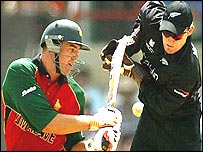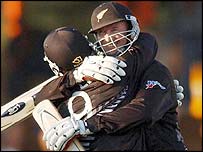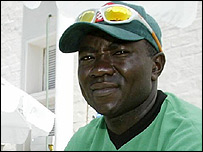| Captain
Heath Streak said Zimbabwe had
nowhere to hide after they were
beaten by New Zealand in
Bloemfontein.
The six-wicket defeat leaves the
tournament co-hosts rooted to the
bottom of the Super Six table. |
|
 |
| |
|
|
| New Zealand
all-rounder Chris Cairns said
their game against Zimbabwe was a
must-win. |
|
 |
| |
|
|
| India
overcame a scare to beat Kenya,
thanks to a marvellous hundred by
skipper Sourav Ganguly. Kenya
captain Steve Tikolo says his
side's performance against India
proves they deserve their Super
Six place. |
|
 |
|
|
Die
Kricket-Weltmeisterschaft 2003,
abgehalten in Südafrika und im
benachbarten Simbabwe, sollte nach dem
Willen ihrer Veranstalter helfen, Afrika
zu einigen. Doch schon im Vorfeld hatte
es Zensur und politischen Streit gegeben.
Hinzu kamen unzureichende Vorbereitungen
der Organisatoren, die dazu führten,
dass in die Endrunde der angeblich sechs
besten Nationalmannschaften zwei
afrikanische Teams einzogen, die das
nicht ausschliesslich eigener Leistung zu
verdanken haben. Kenia und Simbabwe kamen
in die Runde der "Super Six",
weil einerseits die Mannschaften aus
England und Neuseeland in den Streit um
die Menschenrechtssituation in Simbabwe
hineingezogen wurden und durch
Spielabsagen Punkte verloren, und weil
andererseits keine Vorkehrungen getroffen
waren, nach schweren Regenfällen - z.B.
in Simbabwe - in Nachspielzeiten zu
fairen Ergebnissen zu kommen. |